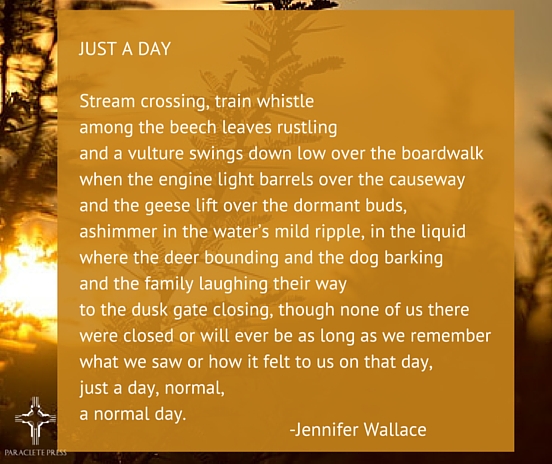Sometimes, too rarely, I walk at an urban nature area near my Baltimore home. There’s nothing pristine about Lake Roland. The water is a little bit rancid; the well-loved dog park smells—well—like dogs. Commuter train tracks cut the tails in half. The trees are vine-choked. And the place is an “island” amidst the surrounding sprawl, an oasis for fox, coyotes, deer, migrating birds and for humans who need a little R & R.
This recent poem, “Just a Day,” birthed itself at the end of a late-winter walk around the lake. It emerged from a resonance, a sensation…my mind gently turned for me, tuning me, toward what I am meant to notice: confluences, textures, connections, nodes, notes and chords. I am reminded of Paul Éluard’s oft-quoted notion: There is another world but it is in this one.
Since writing this poem, my experience of witness on that ‘normal’ day has become complicated by Pope Francis’ exhortation very early on in his encyclical letter Laudato si’: On Care for Our Common Home:
“Nothing in this world is indifferent to us.”
I am struck by how this idea transforms my poem. What I had thought of as an outward- facing documentary record now takes on a different register. Instead of—as the poem asks—remembering “…what we saw or how it felt to us,” the focus becomes more relational, more dynamic. I am not the only one looking. What happens if I consider that the world(s) I saw on that “normal” day are looking at me, thinking of me? Are caring for and questioning me?
Rainer Maria Rilke wrote about “in-seeing,” to let ourselves go into the center of things, the point from which they begin to be themselves. In his famous poem, “Archaic Torso of Apollo,” he allows himself to be seen by what he is seeing. And he recognizes the life-changing impact of that. But Pope Francis takes it further. By engaging with the idea of indifference, we are asked with more urgency to consider reciprocity and the consequences of ignorance.
It is exciting to see my poem—an art object I thought I understood—become something else once it encounters and is encountered by the world. It is equally exciting, and somewhat daunting, to realize that I, too, have become—and must become—something new as a result of this encounter. The next time I take a walk at Lake Roland (or anywhere, for that matter), I will try to remember how it feels to be looked at without indifference, how it feels to be looked at by the rancid lake. By the vine-choked trees. By too many smelly dogs. By the lake’s waters spilling feelingless over the dam. And even by all of what I cannot see.
Jennifer Wallace
Her new poetry collection is due to be published Spring 2017 by Paraclete Press.
